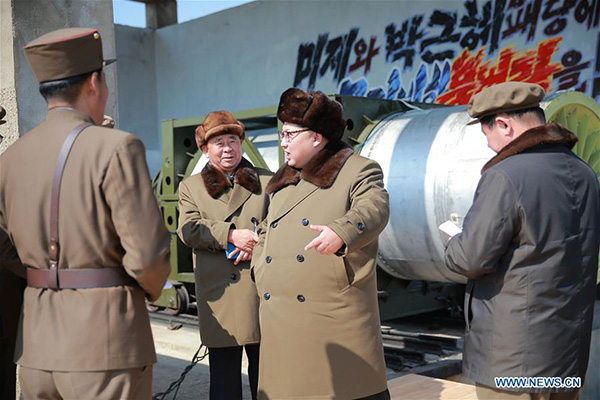Talks can help ease Pyongyang's woes
Updated: 2016-05-04 15:02
By HU MINGYUAN(chinadaily.com.cn)
|
|||||||||
 |
|
Photo provided by Korean Central News Agency (KCNA) on March 24, 2016 shows the top leader of the Democratic People's Republic of Korea (DPRK) Kim Jong-un guiding a ground test for heavy-lift, solid-fuel rocket engine and its separation. [Photo/Xinhua] |
The Democratic People's Republic of Korea announced last week that the ruling Workers' Party of Korea will hold its 7th Congress in Pyongyang on May 6. It will be the first major conference of the party in 36 years and the first under current DPRK leader Kim Jong-un.
The ensuing changes in the party’s rank and file are expected to be big and will have far-reaching implications on the country. The conference could see the Workers’ Party of Korea strengthening its hold over the military. It is also expected to highlight Kim's major political achievements in the five years he has been in power, especially in the development of nuclear weapons and deployment of ballistic missiles.
On the diplomatic front, the DPRK, which is suffering the consequences of the UN sanctions and could change its mindset and hint at reconciling with the international community.
The passing of Resolution 2270 by the UN Security Council on March 2 against the DPRK despite its concerns for the well-being of the country’s ordinary people has put added pressure on the Pyongyang leadership.
To facilitate the country's economic recovery and create a benign environment for the party, the country’s leadership should have sought to hold dialogues with other countries, such as the United States. But instead of doing so, the DPRK declared on April 23 that it had successfully test-fired an underwater strategic submarine ballistic missile, apparently to welcome the party congress and boost people's morale, and thus created more uncertainties on the Korean Peninsula.
The UN Security Council strongly condemned Pyongyang's latest ballistic missile test, and urged it to "refrain from further actions in violation of the relevant resolutions and comply fully with its obligations under these resolutions, including to suspend all activities related to its ballistic missile program". Concerns were also raised regarding the DPRK's possible fifth nuclear test given the increased activities near its main nuclear test site in the northeastern region, where it has conducted all of its four nuclear tests.
The DPRK's nuclear advocacy has been increasingly clear since 2013, when it decided to simultaneously pursue economic development and nuclear power. But the truth is, its nuclear strategy has only pushed the Republic of Korea closer to the US and strengthened their military alliance, injecting fresh momentum into the long-stalled deployment of the US-sponsored Terminal High Altitude Area Defense anti-missile system on the Korean Peninsula. The DPRK’s wrong decision has given the US a good excuse to strengthen its military presence on the peninsula, which will pose huge strategic threats to Russia, China as well as the DPRK.
Pyongyang would commit a grave mistake if it continues to believe that its national security depends on its nuclear arsenal, because that will only cause more harm to regional stability and draw harsher sanctions against the DPRK. The only viable option left for the DPRK is to re-engage in the Six-Party Talks, abandon its nuclear program for good and cooperate with the international community.
The author is an associate researcher at the Center for Northeast Asian Studies in Jilin province.
Related Stories
DPRK sentences ROK-born American to 10 years of hard labor 2016-04-29 17:16
UN urges DPRK to stop any 'further provocative action' 2016-04-29 09:44
DPRK's Musudan missile launch appears to have failed 2016-04-28 16:15
ROK's president says DPRK can conduct 5th nuke test at any time 2016-04-26 21:27
Today's Top News
Inspectors to cover all of military
Britons embrace 'Super Thursday' elections
Campaign spreads Chinese cooking in the UK
Trump to aim all guns at Hillary Clinton
Labour set to take London after bitter campaign
Labour candidate favourite for London mayor
Fossil footprints bring dinosaurs to life
Buffett optimistic on China's economic transition
Hot Topics
Lunar probe , China growth forecasts, Emission rules get tougher, China seen through 'colored lens', International board,
Editor's Picks

|

|

|

|

|

|







